Note to readers: Dr. Micah Goodman is Rosh Midrashah of Ein Prat- The Academy for Leadership, lectures on Jewish Thought at the Hebrew University, serves as a senior fellow in Shalom Hartman Institute in Jerusalem, and teaches on numerous Tikvah Fund programs. In recent years, Dr. Goodman has become a prominent voice in Israel on issues of Zionism, Judaism, and contemporary Israeli problems, frequently lecturing at the prime minister’s residence and delivering a weekly Torah talk on Israeli channel 2. His first book, Sodotav shel Moreh ha-Nevukhim, on Rambam’s Moreh Nevukhim, is an Israeli bestseller, and a second book, on Sefer ha-Kuzari, will be released shortly..
Do you feel that Moreh Nevukhim’s approach to divine intervention is suited to address our modern sensibilities?
Tragically, yes. When you say “modern sensibilities,” I think what you mean is the fact that post-modern people went through a secularization in their understanding of the world. By that I mean that pre-modern people, when they wanted to understand the world, they found an explanation in the holy texts, the holy Scriptures. And for us, even as religious people, this part of life went through secularization, wherein human reason replaced the sacred texts. I think about the way secularization also swallowed other parts of our lives, our religious lives, such as our politics. Most of my religious friends and I want our politics secularized. Maybe also our psychology. For religious people, our prime motivation for doing good things comes from worrying about olam ha-ba — that’s also secularized, for many religious people. I would say today that being religious in a modern world means that parts of your life went through secularization, and our conception of nature is the first. And since we understand nature through reason, it’s very hard to understand divine intervention, as reason allows no place for divine intervention in the natural world.
That’s where Maimonides comes in, attempting to make this concept palatable to rational minds. What’s great about Maimonides is that he didn’t offer his explanations in modern times; he offered his explanations in the Middle Ages, which means that Maimonides’ explanations are not apologetics. He comes at it as a systematic theology and not as a response to the modern challenge. Tapping into his answers can help us out also because he wasn’t thinking of these answers as an attempt to make sense of a religious world that went through partial secularization.
Do you think that, despite what you said, Maimonides’ approach to divine intervention or concepts such as the Messiah was influenced by issues during his time?
If today Maimonides is in harmony with the issues of our time, back then he was in contrast with the issues of his time. The majority of people sitting around him in shul imagined God, Messiah, providence, intervention, in a radically different way than he did. So I would say, paradoxically, that if today we use Maimonides in order to make sense out of our time, he was radically in contrast with his own time, so to many people around him he didn’t make any sense.
Is there any event in the history of the State of Israel that you would describe as miraculous?
Yes. The whole thing, Chesky, the whole thing. I think the Yom Kippur War wasn’t miraculous, the Six Day War was our soldiers, the War of Independence was our brilliance. There isn’t one event that I can say is “miraculous.” What’s miraculous is the entire package, the whole thing. The whole thing, which I think has a number of elements. One, the revival of the Hebrew language, something that never happened before. The awakening of national awareness, the kibbuts galuyot (ingathering of the exiles), and the unbelievable success of Israel – economically, militarily – the whole thing is a story that was never told before, and living in Israel and trying to be a part of the project of making Israel more interesting, more spiritual and more strong, I feel like the whole thing as a mikhlol (totality), not as a perati (particular phenomenon), is an unbelievable story, and the only reason I believe it is because it’s actually happening.
What is your ultimate goal for the midrashah? Do you hope to influence Israeli society or the larger Jewish world with your work?
Let’s first try to describe how it works. It’s a kind of a yeshivah, but it’s a yeshivah I’ve never learnt in. It’s a yeshivah that has four pieces. One piece is Great Works of Western civilization: Homer, Shakespeare, Plato, Aristotle. The second piece, which we invest much more time and energy in, is our great works, specifically Bible and Talmud. A third piece is “Israeliness,” trying to understand the great challenges and opportunities that Israel faces when it comes to relationships with the Israeli-Arab conflict, religion and state, and so on. The fourth piece is strengthening the body – martial arts, running, a lot of yoga. It’s extremely intensive – early in the morning until late at night – strengthening your body, understanding Israel, deepening our understanding of the Great Works of the West, and finally, connecting ourselves to the greatness of Judaism. Those are the four elements of the curriculum at Ein Prat. Ein Prat started as a program for people after the army, in what David Brooks called the “Odyssey years,” the years in which you have the maturity of an adult and the responsibilities of a young person. That lasts for a few years; those are great years, and those are the most important years of a Western civilization. That’s when leadership is born, that’s when the best ideas are generated. In Israel, the “Odyssey years,” I would say, are from the moment you finish the army to the moment you get married, find a job, and, as they say in Israel, “move to Modi’in.”
We’re here for those years, for those strategic years in your life. The brainstorm of Ein Prat is not only the time, but also the population. About 30% of the people that come to Ein Prat are religious, about 70% are secular. So what you have is a very heterogeneous curriculum for a very heterogeneous crowd. Seven years ago, six people came, and this year 315 students came. Thank God, this says something about Israeli society; it also says something of what could be Israeli society. So I would say the following, that Ein Prat has aspirations to change Israel in the following sense: We want to have an impact on the religious world and a stronger impact on the secular world. We want to create an option to live a much more open Orthodox world. For Americans this is trivial; for Israelis it’s less trivial. But especially for secular Israelis we want to offer them an option to live a modern secular life much more connected to Judaism.
So we want to offer religious people to live a more open religious life and secular people to live a more Jewish secular life, and together, both of them together, can create a new passionate Israeli mainstream. And so that’s our vision for Israel and we’re very optimistic. We’re optimistic because of the 1,400 graduates of Ein Prat who are highly active in Israeli society. They’re working as a network to make a difference in Israeli society. They’re building minyanim in communities all over Israel and they have their friends from universities joining them and being influenced and inspired by them. And in the end, one conclusion is that we’ll change the society; our institutions, when they’re successful, will offer a live option even for people that don’t actually attend them.
I want to explain this sociological observation. There’s an extremely successful institution in Israel called Merkaz ha-Rav. People see themselves as ‘merkaznikim’ even if they’ve never stepped into Merkaz ha-Rav, because the institution already represents a whole way of life. Yeshivat Har Etzion is another example. People ask “are you a ‘gushnik’ type?,” and you can say, “Yes, I guess I am a ‘gushnik’ even if I was never in Gush Etzion and never listened to Rav Aharon.” An institution is successful if it offers a way of life even for people who didn’t learn there. And how do they do that? Mostly because of a critical mass of charismatic graduates that represent the institution in a way that makes people want to join. The vision for Ein Prat is that, and I think in some way we’re already there, is when I hear people asking a secular Israeli, “Are you secular?,” and he starts stumbling on his words and says, “You know I’m not secular but I’m not religious, I’m Ein Prat type.” The institution represents a way that enables secular Israelis to be connected to and inspired by their Judaism without necessarily becoming religious. And for sophisticated secular Israelis, until Ein Prat that wasn’t that much of an option. So that’s our vision to empower the Israeli mainstream.
You’re not a ‘gushnik,’ are you? I’m only a little bit joking.
I’m a fan.
Why did you choose to write a book about Moreh Nevukhim? Did you recognize a gap in the preexisting literature that you wanted to fill? And what makes your approach to Moreh Nevukhim different from that of other scholars?
I chose to write about Moreh Nevukhim for two reasons. First, I felt that, for most people, Moreh Nevukhim is not accessible to them, and my first goal was to make it accessible to many, many people. And my second goal was to develop an understanding, and put some thoughts together that I don’t think were never stated before, but that I packaged in a way that I think was quite new. And that is the understanding that the real purpose of Moreh Nevukhim is the mevukhah (perplexity), and Rambam is not there to solve our perplexities but to guide us in how to live with perplexities. And that point had been heard here and there, but was never quite stated in a way that would be relevant to people’s way of life, so that was important for me to do: To see Rambam as inspiration for people that feel perplexed and have no guidance, and to change their paradigm. Meaning, we’re not turning to Rambam to solve our perplexities, but to guide us in how to live with perplexities and how to leverage our perplexities to live a more religious and rich life. That was important for me when I was writing the book. I think that’s why I was writing the book.
This is what I tried to do, but I don’t know if I succeeded. I tried to write a book that’s challenging academically. In other words, to write a book that tries to offer some hiddush academically to challenge the regular thinking about Moreh Nevukhim, and at the same time to make it accessible and exciting for people that have never read Moreh Nevukhim. That was my challenge, to deal with both. I don’t know if I succeeded. There was a lot of critique about my book for good and for less good, but that’s what I tried to do.
Would you like to add anything about your new book on the Kuzari?
Yes; it’s coming out in a week or two which means that it will probably be out when this interview will be published. It’s the same; I tried to do the same thing again. In other words, I tried to write a book that will make a classic Israeli book, a classic Jewish book, the Kuzari, exciting and accessible to many people, and also hopefully challenging to people who read the Kuzari in the past and are involved in the conversation about the Kuzari. And I decided to write a book on the Kuzari because I feel like Maimonides’ Moreh Nevukhim is a great book that expresses only a part of Judaism. There is another side to Judaism, or there are more sides to Judaism. There’s something a little bit more mystical and much more emotional with more imagination that, inasmuch as Maimonides didn’t really express imagination, wasn’t captured and expressed in Moreh Nevukhim. And I feel like the Kuzari is a great book that expressed that other world which is as extremely Jewish as Maimonidean rationalism is Jewish. That’s why I wrote about the Kuzari, because I wanted to express the other side of Judaism. And also, I’ve got to say that my book about Moreh Nevukhim doesn’t only express a part of Judaism; it also expresses a part of who I am, and the Kuzari helps me complete that. So hopefully if this book will be successful, if you read both books, with both of the classics, it’s a great introduction. I hope that both books together will be of great interest in Jewish philosophy.


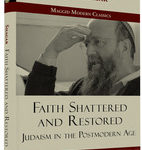
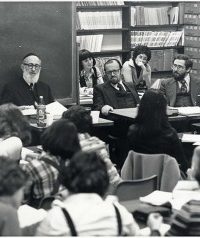
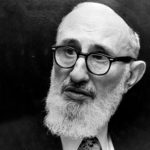

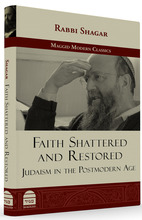
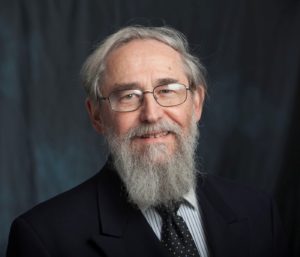


An Interview with Dr. Micah Goodman
Note to readers: Dr. Micah Goodman is Rosh Midrashah of Ein Prat- The Academy for Leadership, lectures on Jewish Thought at the Hebrew University, serves as a senior fellow in Shalom Hartman Institute in Jerusalem, and teaches on numerous Tikvah Fund programs. In recent years, Dr. Goodman has become a prominent voice in Israel on issues of Zionism, Judaism, and contemporary Israeli problems, frequently lecturing at the prime minister’s residence and delivering a weekly Torah talk on Israeli channel 2. His first book, Sodotav shel Moreh ha-Nevukhim, on Rambam’s Moreh Nevukhim, is an Israeli bestseller, and a second book, on Sefer ha-Kuzari, will be released shortly..
Do you feel that Moreh Nevukhim’s approach to divine intervention is suited to address our modern sensibilities?
Tragically, yes. When you say “modern sensibilities,” I think what you mean is the fact that post-modern people went through a secularization in their understanding of the world. By that I mean that pre-modern people, when they wanted to understand the world, they found an explanation in the holy texts, the holy Scriptures. And for us, even as religious people, this part of life went through secularization, wherein human reason replaced the sacred texts. I think about the way secularization also swallowed other parts of our lives, our religious lives, such as our politics. Most of my religious friends and I want our politics secularized. Maybe also our psychology. For religious people, our prime motivation for doing good things comes from worrying about olam ha-ba — that’s also secularized, for many religious people. I would say today that being religious in a modern world means that parts of your life went through secularization, and our conception of nature is the first. And since we understand nature through reason, it’s very hard to understand divine intervention, as reason allows no place for divine intervention in the natural world.
That’s where Maimonides comes in, attempting to make this concept palatable to rational minds. What’s great about Maimonides is that he didn’t offer his explanations in modern times; he offered his explanations in the Middle Ages, which means that Maimonides’ explanations are not apologetics. He comes at it as a systematic theology and not as a response to the modern challenge. Tapping into his answers can help us out also because he wasn’t thinking of these answers as an attempt to make sense of a religious world that went through partial secularization.
Do you think that, despite what you said, Maimonides’ approach to divine intervention or concepts such as the Messiah was influenced by issues during his time?
If today Maimonides is in harmony with the issues of our time, back then he was in contrast with the issues of his time. The majority of people sitting around him in shul imagined God, Messiah, providence, intervention, in a radically different way than he did. So I would say, paradoxically, that if today we use Maimonides in order to make sense out of our time, he was radically in contrast with his own time, so to many people around him he didn’t make any sense.
Is there any event in the history of the State of Israel that you would describe as miraculous?
Yes. The whole thing, Chesky, the whole thing. I think the Yom Kippur War wasn’t miraculous, the Six Day War was our soldiers, the War of Independence was our brilliance. There isn’t one event that I can say is “miraculous.” What’s miraculous is the entire package, the whole thing. The whole thing, which I think has a number of elements. One, the revival of the Hebrew language, something that never happened before. The awakening of national awareness, the kibbuts galuyot (ingathering of the exiles), and the unbelievable success of Israel – economically, militarily – the whole thing is a story that was never told before, and living in Israel and trying to be a part of the project of making Israel more interesting, more spiritual and more strong, I feel like the whole thing as a mikhlol (totality), not as a perati (particular phenomenon), is an unbelievable story, and the only reason I believe it is because it’s actually happening.
What is your ultimate goal for the midrashah? Do you hope to influence Israeli society or the larger Jewish world with your work?
Let’s first try to describe how it works. It’s a kind of a yeshivah, but it’s a yeshivah I’ve never learnt in. It’s a yeshivah that has four pieces. One piece is Great Works of Western civilization: Homer, Shakespeare, Plato, Aristotle. The second piece, which we invest much more time and energy in, is our great works, specifically Bible and Talmud. A third piece is “Israeliness,” trying to understand the great challenges and opportunities that Israel faces when it comes to relationships with the Israeli-Arab conflict, religion and state, and so on. The fourth piece is strengthening the body – martial arts, running, a lot of yoga. It’s extremely intensive – early in the morning until late at night – strengthening your body, understanding Israel, deepening our understanding of the Great Works of the West, and finally, connecting ourselves to the greatness of Judaism. Those are the four elements of the curriculum at Ein Prat. Ein Prat started as a program for people after the army, in what David Brooks called the “Odyssey years,” the years in which you have the maturity of an adult and the responsibilities of a young person. That lasts for a few years; those are great years, and those are the most important years of a Western civilization. That’s when leadership is born, that’s when the best ideas are generated. In Israel, the “Odyssey years,” I would say, are from the moment you finish the army to the moment you get married, find a job, and, as they say in Israel, “move to Modi’in.”
We’re here for those years, for those strategic years in your life. The brainstorm of Ein Prat is not only the time, but also the population. About 30% of the people that come to Ein Prat are religious, about 70% are secular. So what you have is a very heterogeneous curriculum for a very heterogeneous crowd. Seven years ago, six people came, and this year 315 students came. Thank God, this says something about Israeli society; it also says something of what could be Israeli society. So I would say the following, that Ein Prat has aspirations to change Israel in the following sense: We want to have an impact on the religious world and a stronger impact on the secular world. We want to create an option to live a much more open Orthodox world. For Americans this is trivial; for Israelis it’s less trivial. But especially for secular Israelis we want to offer them an option to live a modern secular life much more connected to Judaism.
So we want to offer religious people to live a more open religious life and secular people to live a more Jewish secular life, and together, both of them together, can create a new passionate Israeli mainstream. And so that’s our vision for Israel and we’re very optimistic. We’re optimistic because of the 1,400 graduates of Ein Prat who are highly active in Israeli society. They’re working as a network to make a difference in Israeli society. They’re building minyanim in communities all over Israel and they have their friends from universities joining them and being influenced and inspired by them. And in the end, one conclusion is that we’ll change the society; our institutions, when they’re successful, will offer a live option even for people that don’t actually attend them.
I want to explain this sociological observation. There’s an extremely successful institution in Israel called Merkaz ha-Rav. People see themselves as ‘merkaznikim’ even if they’ve never stepped into Merkaz ha-Rav, because the institution already represents a whole way of life. Yeshivat Har Etzion is another example. People ask “are you a ‘gushnik’ type?,” and you can say, “Yes, I guess I am a ‘gushnik’ even if I was never in Gush Etzion and never listened to Rav Aharon.” An institution is successful if it offers a way of life even for people who didn’t learn there. And how do they do that? Mostly because of a critical mass of charismatic graduates that represent the institution in a way that makes people want to join. The vision for Ein Prat is that, and I think in some way we’re already there, is when I hear people asking a secular Israeli, “Are you secular?,” and he starts stumbling on his words and says, “You know I’m not secular but I’m not religious, I’m Ein Prat type.” The institution represents a way that enables secular Israelis to be connected to and inspired by their Judaism without necessarily becoming religious. And for sophisticated secular Israelis, until Ein Prat that wasn’t that much of an option. So that’s our vision to empower the Israeli mainstream.
You’re not a ‘gushnik,’ are you? I’m only a little bit joking.
I’m a fan.
Why did you choose to write a book about Moreh Nevukhim? Did you recognize a gap in the preexisting literature that you wanted to fill? And what makes your approach to Moreh Nevukhim different from that of other scholars?
I chose to write about Moreh Nevukhim for two reasons. First, I felt that, for most people, Moreh Nevukhim is not accessible to them, and my first goal was to make it accessible to many, many people. And my second goal was to develop an understanding, and put some thoughts together that I don’t think were never stated before, but that I packaged in a way that I think was quite new. And that is the understanding that the real purpose of Moreh Nevukhim is the mevukhah (perplexity), and Rambam is not there to solve our perplexities but to guide us in how to live with perplexities. And that point had been heard here and there, but was never quite stated in a way that would be relevant to people’s way of life, so that was important for me to do: To see Rambam as inspiration for people that feel perplexed and have no guidance, and to change their paradigm. Meaning, we’re not turning to Rambam to solve our perplexities, but to guide us in how to live with perplexities and how to leverage our perplexities to live a more religious and rich life. That was important for me when I was writing the book. I think that’s why I was writing the book.
This is what I tried to do, but I don’t know if I succeeded. I tried to write a book that’s challenging academically. In other words, to write a book that tries to offer some hiddush academically to challenge the regular thinking about Moreh Nevukhim, and at the same time to make it accessible and exciting for people that have never read Moreh Nevukhim. That was my challenge, to deal with both. I don’t know if I succeeded. There was a lot of critique about my book for good and for less good, but that’s what I tried to do.
Would you like to add anything about your new book on the Kuzari?
Yes; it’s coming out in a week or two which means that it will probably be out when this interview will be published. It’s the same; I tried to do the same thing again. In other words, I tried to write a book that will make a classic Israeli book, a classic Jewish book, the Kuzari, exciting and accessible to many people, and also hopefully challenging to people who read the Kuzari in the past and are involved in the conversation about the Kuzari. And I decided to write a book on the Kuzari because I feel like Maimonides’ Moreh Nevukhim is a great book that expresses only a part of Judaism. There is another side to Judaism, or there are more sides to Judaism. There’s something a little bit more mystical and much more emotional with more imagination that, inasmuch as Maimonides didn’t really express imagination, wasn’t captured and expressed in Moreh Nevukhim. And I feel like the Kuzari is a great book that expressed that other world which is as extremely Jewish as Maimonidean rationalism is Jewish. That’s why I wrote about the Kuzari, because I wanted to express the other side of Judaism. And also, I’ve got to say that my book about Moreh Nevukhim doesn’t only express a part of Judaism; it also expresses a part of who I am, and the Kuzari helps me complete that. So hopefully if this book will be successful, if you read both books, with both of the classics, it’s a great introduction. I hope that both books together will be of great interest in Jewish philosophy.